When most entrepreneurs take into consideration search engine optimisation, they bounce straight to key phrases like “finest trainers” or “the way to do [whatever]”. Non-branded, high-intent, top-of-funnel stuff.
However our newest research may shock you:
Almost half of all Google searches (45.7%) are branded searches—which means persons are actively searching for out particular corporations and merchandise they already know.
Yep, almost half of what folks sort into Google features a model title or a product title.
It’s primarily based on a large Ahrefs research of ~150 million U.S. key phrases. We’re speaking arduous knowledge.
So, in case you’re not actively contemplating model advertising and marketing and branded search in your advertising and marketing technique, you could be lacking out on an enormous piece of the pie.
We studied branded queries from two angles: what number of distinctive key phrases are branded, and the way usually these key phrases are searched.
Seems, 36.9% of search queries are branded, however if you consider quantity, branded searches make up 45.7% of all Google searches.
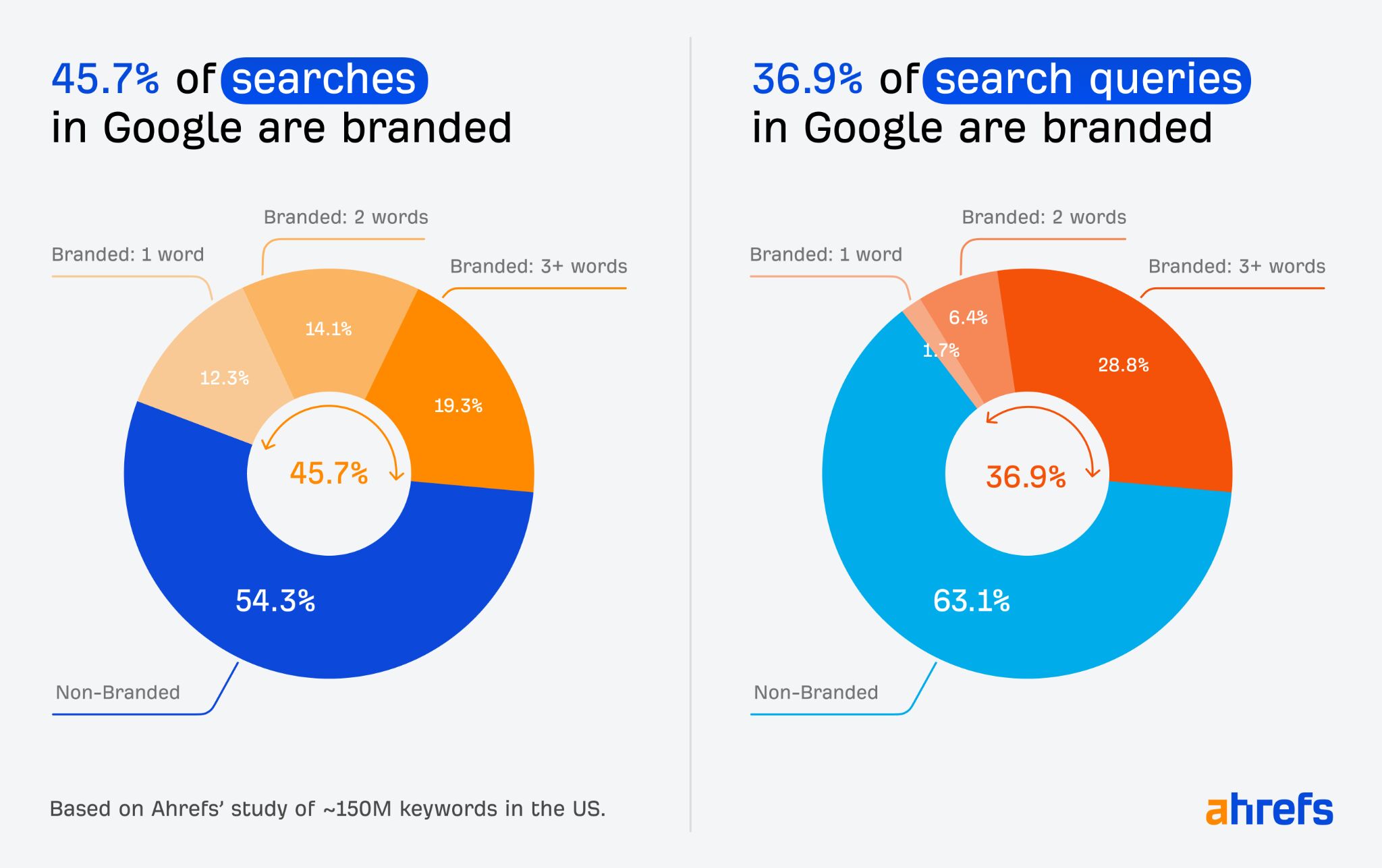

(Shout out to Rand Fishkin for encouraging us to dig deeper on this.)
Mainly, something that features a model title, product title or trademarked time period (we didn’t embrace movie star names within the research, although). Listed here are a number of actual examples from our dataset:
- 1-word branded queries: youtube, amazon, fb.
2-word branded queries: google translate, financial institution of america. - 3+ phrase branded queries: inside out 2 showtimes, iphone 15 professional max.
There are three huge causes you need to care.
1. Model issues greater than chances are you’ll suppose
Folks aren’t simply trying to find classes like “trainers” or “finest espresso.” They’re typing in “nike footwear” or “starbucks close to me”. That implies customers usually already know what they need—and which model they affiliate with it.
Moreover, searches with 3+ phrases have the largest slice of the branded search pie. To me, this means that almost all branded search isn’t folks typing fast model names, it’s folks doing deeper analysis with longer queries like “macbook professional vs air”.
Model consciousness isn’t simply your typical “high of the funnel” consciousness. It’s search demand technology that turns each model impression right into a future branded search.
Model consciousness transforms search intent and creates your aggressive moat. Unknown manufacturers battle for generic termswhere they compete with everybody. Identified manufacturers get searched instantly.
2. search engine optimisation instruments ought to deal with branded queries in a different way
You gained’t rank nicely for “fb” or “youtube”, until you’re Fb or YouTube. So if you’re estimating key phrase issue, search potential, or forecasting visitors, it’s important to filter out branded key phrases. They’re not “winnable” in the identical method non-branded ones are.
That’s precisely why we added a “Search Intent” filter to Ahrefs’ Key phrases Explorer and Website Explorer. It enables you to section branded vs. non-branded key phrases so that you keep away from key phrases the place you’re already in a misplaced place, or see if there are gaps in your individual branded search optimization.
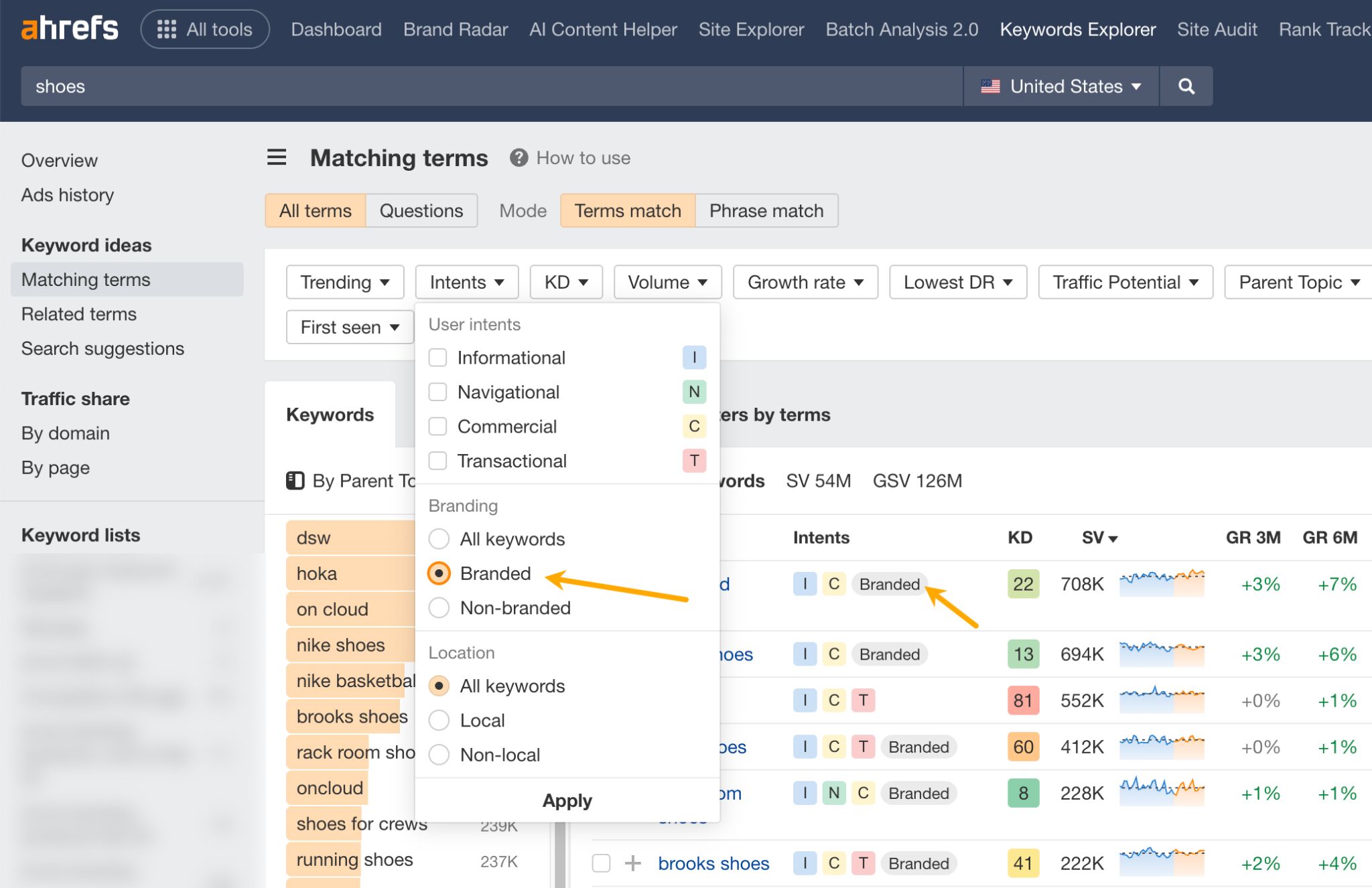

This additionally allows you to simply observe branded vs. non-branded visitors efficiency in Website Explorer (Overview report).
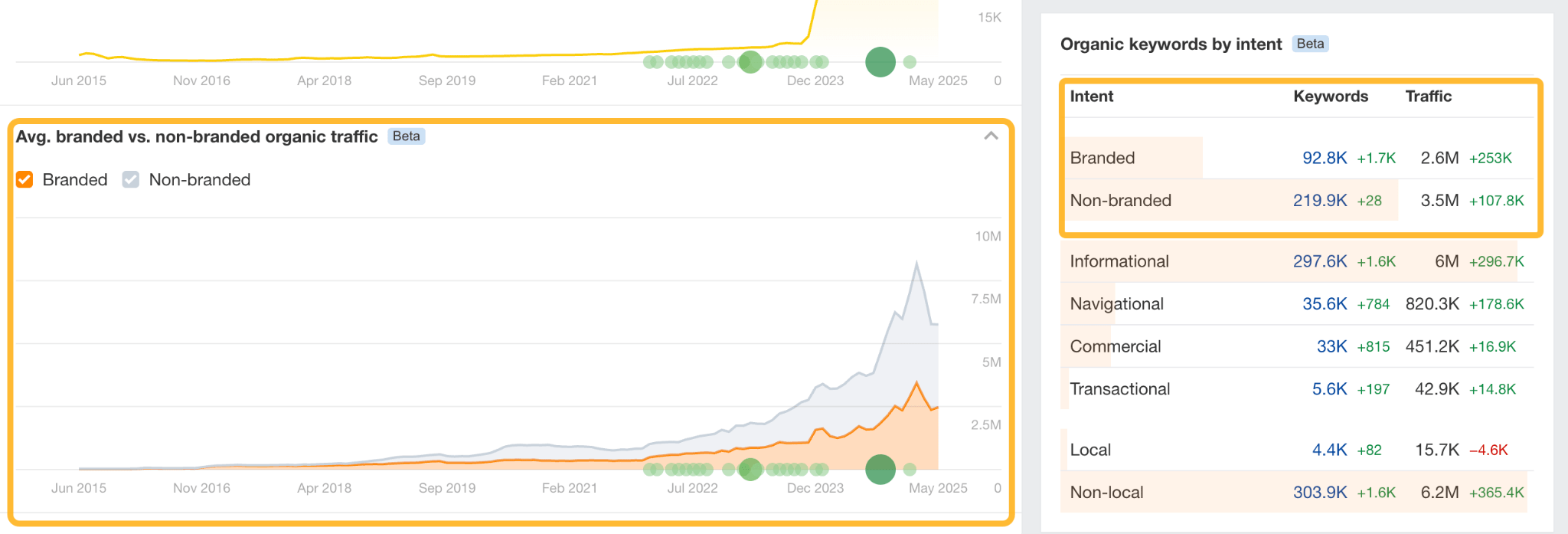

3. You may (and will) optimize for branded search
The homepage isn’t the one outcome web page searchers could be searching for. They might be searching for assist pages, particular merchandise, evaluations, or native listings.
That’s why it’s price auditing how your branded queries carry out and ensuring you management the complete branded SERP with useful, related content material. Consider it as proudly owning your popularity, not simply your homepage.
Let me provide you with two examples from our turf.
Folks had been asking Google whether or not we had a program for associates, and since we didn’t have a web page that answered that, Google tried “its finest” pulling up a web page that contained the phrases “ahrefs” and “affiliate”. Not the perfect expertise, and this was our fault. We fastened that with a fast weblog submit.
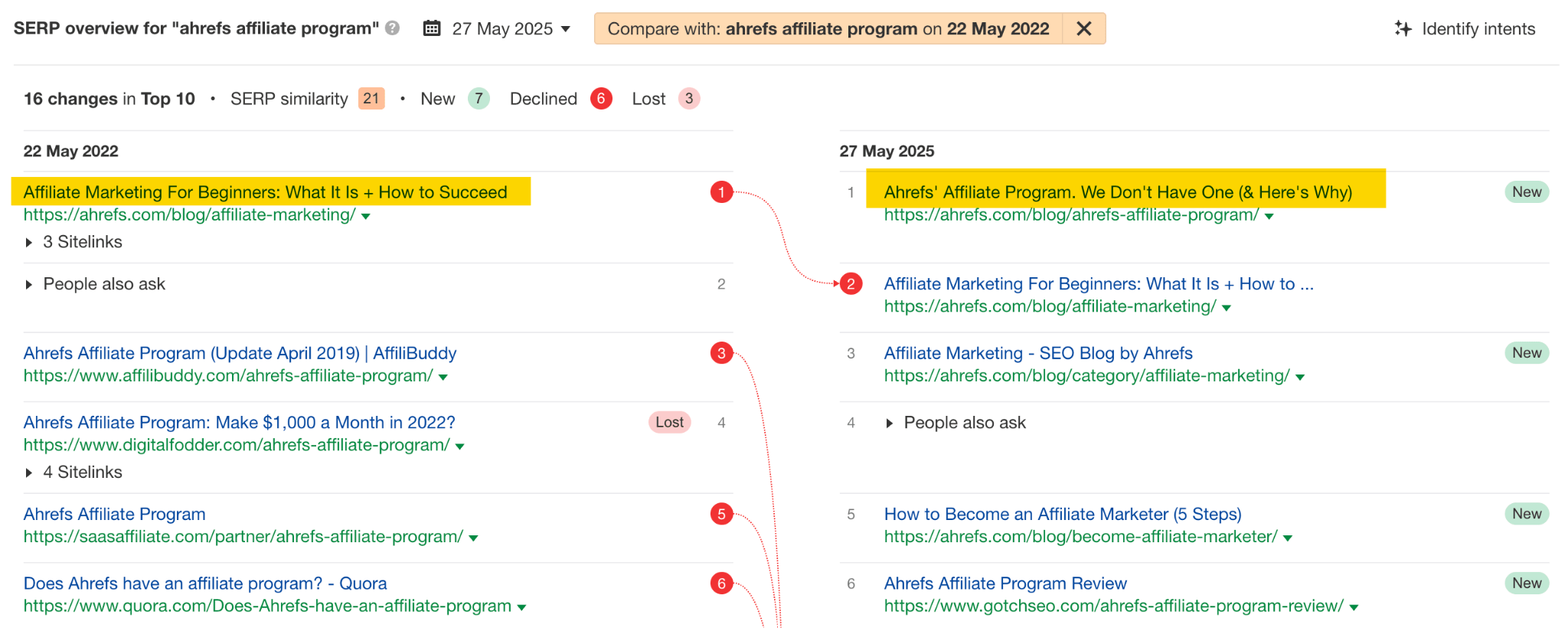

One other instance. Some folks wish to see what’s new in Ahrefs by trying to find one thing like “ahrefs new”. Earlier than we launched a changelog that consolidated all product updates, the SERP was chaos.
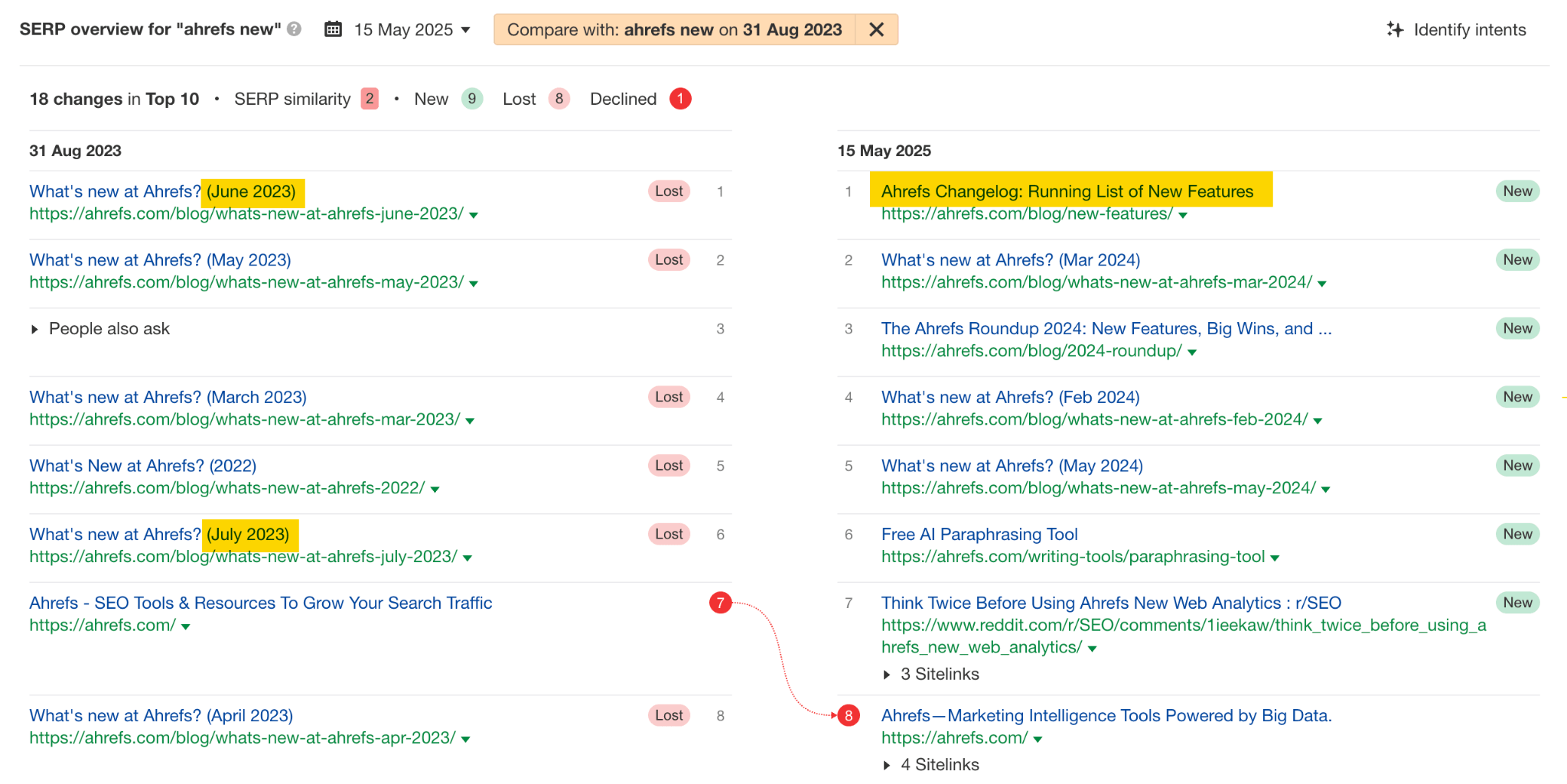

The information sparked loads of feedback on LinkedIn (right here and right here). These are my private favorites:
- Hugo H. Macedo argued that many branded searches are simply navigational: folks typing a model into their browser bar and hitting enter. It’s not all the time model consciousness—generally it’s simply behavior. Or as Alek Asaduryan instructed, Google has grow to be a default navigational device, not only a analysis engine.
- Stefan Repin identified that demand is now usually created outdoors of Google—on social media, podcasts, and different platforms—and Google serves extra because the place folks go as soon as curiosity is sparked.
- Isabel Hughes and Shawn Busse highlighted the murky waters of attribution. Simply because somebody typed your model into Google doesn’t imply search was their first touchpoint.
- John Emoavwodua emphasised that branded search is usually an indication of individuals transferring additional down the funnel—searching for extra information after discovering your model elsewhere.
- Mike Escott made the case {that a} declining model results in fewer branded searches, and generic search efficiency will finally undergo too (that is one thing that deserves a research on its personal).
- Joshua Squires raised an awesome level about retailers who don’t personal the manufacturers they promote—what does branded search imply for them?
- Michael Fertman identified that offline channels (like billboards) can drive branded search quantity too. It’s not simply digital.
- Marcel Nanning summed it up nicely: robust branding makes the whole lot else simpler.
Closing ideas
This research is yet one more reminder that model issues—so much. Even because the search panorama shifts with issues like AI Overviews, model nonetheless stands out as a key driver of visibility within the SERPs.
In actual fact, I’d argue model advertising and marketing is essentially the most underappreciated search engine optimisation technique. After I analyzed search engine optimisation ways of Nasdaq-listed corporations, model energy saved displaying up as an entity inside Google’s information graph that may win SERPS.
I additionally discovered that corporations which have a branded model of an unbranded key phrase, like “mortgage calculator” versus “NerdWallet mortgage calculator”, are likely to rank larger for the generic time period, too. Once more, model advertising and marketing has an impression on search engine optimisation.
So in case you’re investing in search engine optimisation, don’t overlook model. It’s doing extra of the work than most individuals understand.
Received questions or feedback? Let me or Tim know, or drop a remark within the dialogue on LinkedIn.






